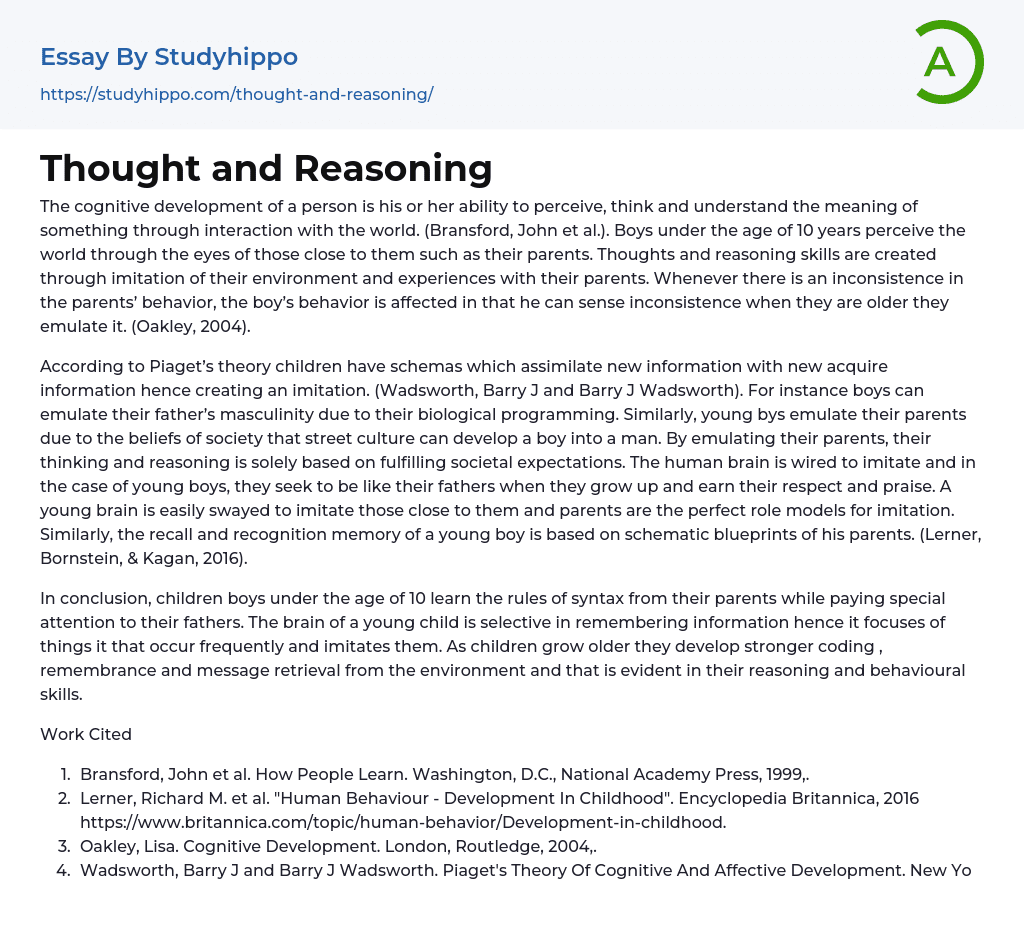The cognitive development of a person is his or her ability to perceive, think and understand the meaning of something through interaction with the world. (Bransford, John et al.). Boys under the age of 10 years perceive the world through the eyes of those close to them such as their parents. Thoughts and reasoning skills are created through imitation of their environment and experiences with their parents. Whenever there is an inconsistence in the parents’ behavior, the boy’s behavior is affected in that he can sense inconsistence when they are older they emulate it. (Oakley, 2004).
According to Piaget’s theory children have schemas which assimilate new information with new acquire information hence creating an imitation. (Wadsworth, Barry J and Barry J Wadsworth). For instance boys can emulate their father’s masculinity due to th
...eir biological programming. Similarly, young bys emulate their parents due to the beliefs of society that street culture can develop a boy into a man. By emulating their parents, their thinking and reasoning is solely based on fulfilling societal expectations. The human brain is wired to imitate and in the case of young boys, they seek to be like their fathers when they grow up and earn their respect and praise. A young brain is easily swayed to imitate those close to them and parents are the perfect role models for imitation. Similarly, the recall and recognition memory of a young boy is based on schematic blueprints of his parents. (Lerner, Bornstein, & Kagan, 2016).
In conclusion, children boys under the age of 10 learn the rules of syntax from their parents while paying special attention to their fathers. The brain of a young child
is selective in remembering information hence it focuses of things it that occur frequently and imitates them. As children grow older they develop stronger coding , remembrance and message retrieval from the environment and that is evident in their reasoning and behavioural skills.
Work Cited
- Bransford, John et al. How People Learn. Washington, D.C., National Academy Press, 1999,.
- Lerner, Richard M. et al. "Human Behaviour - Development In Childhood". Encyclopedia Britannica, 2016 https://www.britannica.com/topic/human-behavior/Development-in-childhood.
- Oakley, Lisa. Cognitive Development. London, Routledge, 2004,.
- Wadsworth, Barry J and Barry J Wadsworth. Piaget's Theory Of Cognitive And Affective Development. New York, Longman, 1984,.
- Boy essays
- Gay essays
- Gender essays
- Gender Identity essays
- Gender Roles In Society essays
- Gender Stereotypes essays
- Girl essays
- Homosexuality essays
- Human Sexual Behavior essays
- Lgbt essays
- Man essays
- Masculinity essays
- Sexual Orientation essays
- Transgender essays
- Woman essays
- Business Analysis essays
- Business Plan essays
- Community Development essays
- Competition essays
- Effective Leadership essays
- Leadership Styles essays
- Mission Statement essays
- Negotiation essays
- Outsourcing essays
- Planning essays
- Public relations essays
- Reasoning essays
- Strategic Management essays
- Strategic Planning essays
- Swot Analysis essays
- Adult essays
- Aggression essays
- Altruism essays
- Archetype essays
- Behavior essays
- Certainty essays
- Conformity essays
- Deception essays
- Human Behavior essays
- Human Sexuality essays
- Maturity essays
- Morality essays
- Obedience essays
- Procrastination essays
- Reinforcement essays
- Role Model essays




